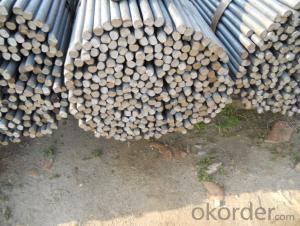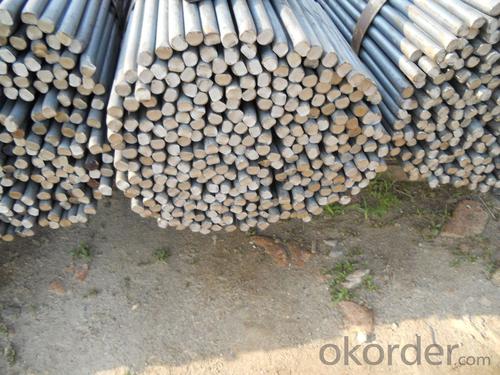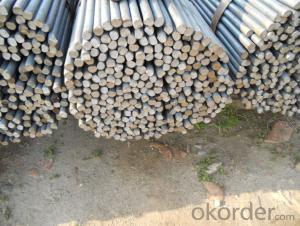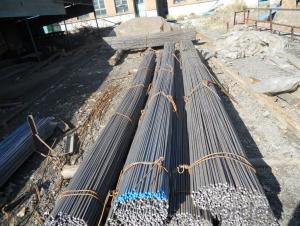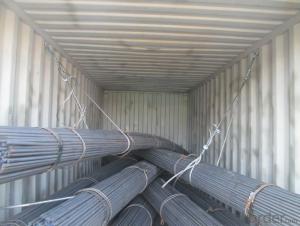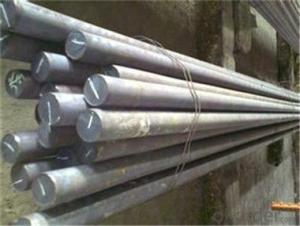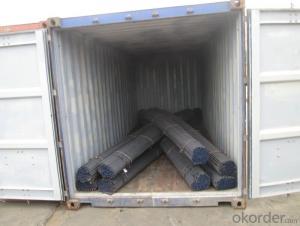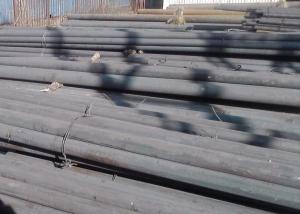Round Bar Made in China with High Quality and Competitive Prices for Sale
- Loading Port:
- Tianjin
- Payment Terms:
- TT OR LC
- Min Order Qty:
- 25 m.t.
- Supply Capability:
- 2000 m.t./month
OKorder Service Pledge
OKorder Financial Service
You Might Also Like
Specification
Product Description:
OKorder is offering Round Bar Made in China with High Quality and Competitive Prices for Sale at great prices with worldwide shipping. Our supplier is a world-class manufacturer of steel, with our products utilized the world over. OKorder annually supplies products to European, North American and Asian markets. We provide quotations within 24 hours of receiving an inquiry and guarantee competitive prices.
Product Applications:
Round Bar Made in China with High Quality and Competitive Prices for Sale are ideal for structural applications and are widely used in the construction of buildings and bridges, and the manufacturing, petrochemical, and transportation industries.
Product Advantages:
OKorder's Round Bar Made in China with High Quality and Competitive Prices for Sale are durable, strong, and resist corrosion.
Main Product Features:
· Premium quality
· Prompt delivery & seaworthy packing (30 days after receiving deposit)
· Corrosion resistance
· Can be recycled and reused
· Mill test certification
· Professional Service
· Competitive pricing
Packaging & Delivery:
Packaging Detail: products are packed in bundle and then shipped by container or bulk vessel, deformed bar is usually naked strapping delivery, when storing, please pay attention to moisture proof. The performance of rust will produce adverse effect.
Each bundle weight: 2-3MT, or as required
Payment term: TT or L/C
Delivery Detail: within 45 days after received advanced payment or LC.
Label: to be specified by customer, generally, each bundle has 1-2 labels
Trade terms: FOB, CFR, CIF
FAQ:
Q1: Why buy Materials & Equipment from OKorder.com?
A1: All products offered byOKorder.com are carefully selected from China's most reliable manufacturing enterprises. Through its ISO certifications, OKorder.com adheres to the highest standards and a commitment to supply chain safety and customer satisfaction.
Q2: How soon can we receive the product after purchase? A2: Within three days of placing an order, we will begin production. The specific shipping date is dependent upon international and government factors, but is typically 7 to 10 workdays. Q3: How do we guarantee the quality of our products?
A3: We have established an advanced quality management system which conducts strict quality tests at every step, from raw materials to the final product. At the same time, we provide extensive follow-up service assurances as required.
Images:
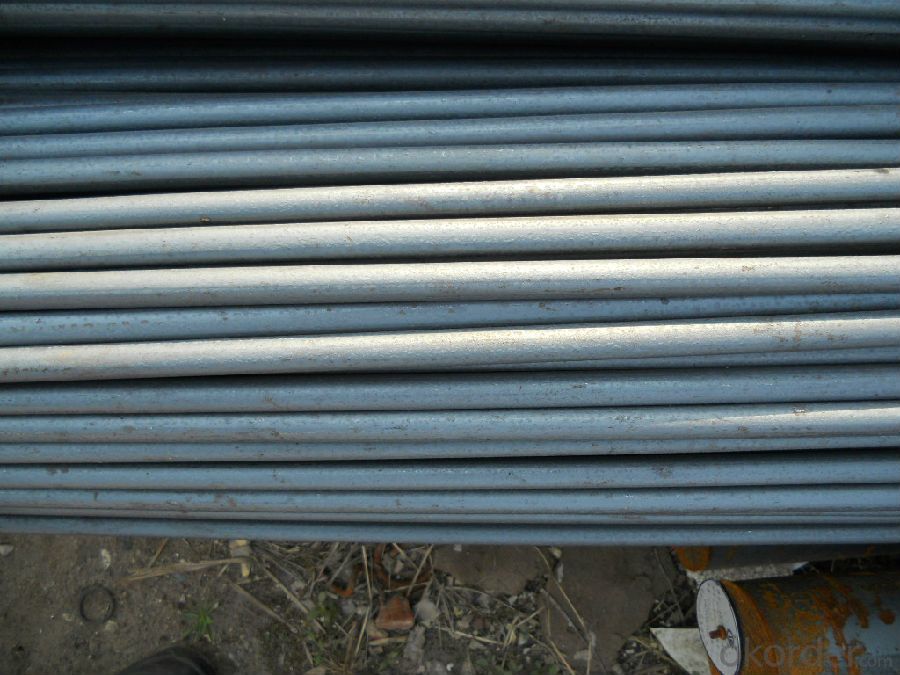
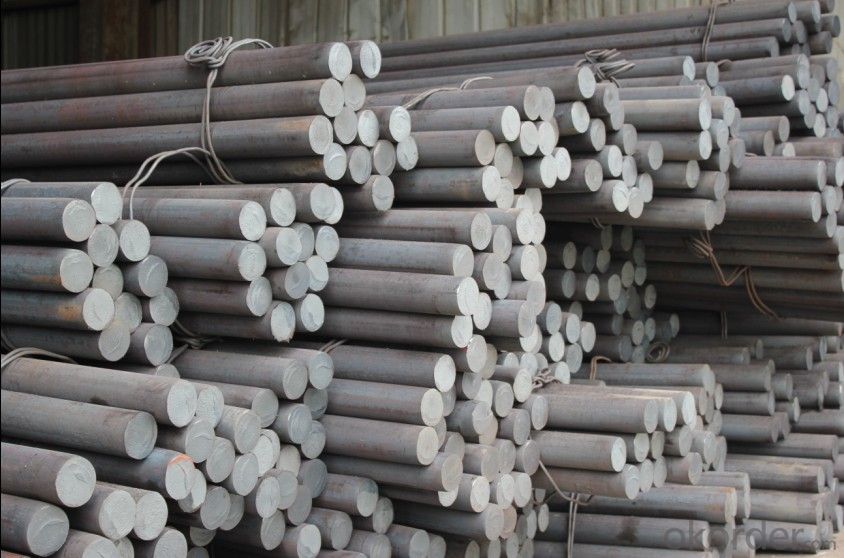
- Q: What are the different types of corrosion-resistant steel round bars?
- There are several different types of corrosion-resistant steel round bars available in the market. Some of the commonly used types include: 1. Stainless Steel Round Bars: Stainless steel is a popular choice for corrosion-resistant applications due to its high resistance to rust and corrosion. It contains chromium, which forms a protective oxide layer on the surface of the steel, preventing further corrosion. 2. Duplex Stainless Steel Round Bars: Duplex stainless steel is a type of stainless steel that contains a balanced combination of austenite and ferrite microstructures. This gives it excellent corrosion resistance, high strength, and good weldability. 3. Nitronic Stainless Steel Round Bars: Nitronic stainless steel is a high-performance alloy that offers superior corrosion resistance, high strength, and good ductility. It contains nitrogen, which enhances its resistance to pitting and crevice corrosion. 4. Alloy Steel Round Bars: Alloy steel is a type of steel that is alloyed with various elements to improve its properties. Some alloy steels, such as corrosion-resistant alloys (CRA), are specifically designed to resist corrosion in harsh environments. These alloys typically contain elements such as chromium, nickel, and molybdenum. 5. Aluminum Round Bars: While not technically steel, aluminum round bars are often used in applications where corrosion resistance is essential. Aluminum forms a protective oxide layer on its surface, which helps prevent corrosion. It is particularly suitable for applications where weight is a concern. 6. Copper-Nickel Round Bars: Copper-nickel alloys, such as Cu-Ni 90/10 and Cu-Ni 70/30, are widely used in marine and offshore applications due to their excellent resistance to seawater corrosion. These alloys have high strength, good ductility, and exceptional resistance to biofouling. These are just a few examples of the different types of corrosion-resistant steel round bars available. The choice of material depends on the specific application requirements, environmental conditions, and budget considerations. It is important to consult with a materials engineer or specialist to select the most suitable corrosion-resistant steel round bar for a particular application.
- Q: Can steel round bars be used for making bicycle frames?
- Yes, steel round bars can be used for making bicycle frames. Steel is a commonly used material in bicycle frame construction due to its strength, durability, and affordability. Steel round bars can be easily shaped and welded to create the desired frame design, making them a suitable choice for bicycle manufacturing.
- Q: What is the elongation of a steel round bar?
- The elongation of a steel round bar refers to the amount of lengthening or stretching the bar undergoes when subjected to an applied force or load.
- Q: Can steel round bars be anodized?
- No, steel round bars cannot be anodized because anodizing is a process that is specifically designed for aluminum and its alloys. Anodizing involves creating an oxide layer on the surface of the metal, which provides enhanced corrosion resistance and can also be used for decorative purposes. Steel, on the other hand, does not form a stable oxide layer like aluminum, and therefore cannot be anodized in the same way. However, there are other surface treatment options available for steel, such as galvanizing or powder coating, which can provide similar benefits.
- Q: Can steel round bars be used for making kitchen utensils?
- Yes, steel round bars can be used for making kitchen utensils. Steel is a strong and durable material that is commonly used in the production of kitchen utensils due to its resistance to corrosion, heat, and chemical damage. Steel round bars can be easily shaped and molded into various utensils such as spoons, forks, knives, and ladles. Additionally, steel utensils are non-reactive, which means they do not leach harmful substances into food, making them a safe choice for cooking and food preparation.
- Q: Can steel round bars be used in the aerospace manufacturing industry?
- Yes, steel round bars can be used in the aerospace manufacturing industry. Steel round bars are commonly used in various aerospace applications such as structural components, landing gear, engine components, and fasteners. The high strength and durability of steel make it suitable for these critical aerospace applications. Additionally, steel round bars can be easily machined and formed into complex shapes, allowing for customization and precise engineering requirements in the aerospace industry. Furthermore, steel's resistance to corrosion and its ability to withstand extreme temperatures make it a reliable choice for aerospace manufacturing. Overall, steel round bars are a versatile and widely used material in the aerospace industry due to their strength, durability, machinability, and resistance to corrosion.
- Q: What is the typical tolerance for diameter and length in steel round bars?
- The typical tolerance for diameter in steel round bars is usually +/- 0.005 inches, while the tolerance for length is typically +/- 0.125 inches.
- Q: What are the different surface treatments available for alloy steel round bars?
- Some of the different surface treatments available for alloy steel round bars include black oxide coating, galvanization, chrome plating, nitriding, and powder coating. Each treatment offers unique benefits such as enhanced corrosion resistance, improved wear resistance, increased hardness, and aesthetic appeal. The choice of surface treatment depends on the specific requirements and desired performance characteristics of the alloy steel round bars.
- Q: Can steel round bars be used for making sway bars?
- Yes, steel round bars can be used for making sway bars. Sway bars, also known as stabilizer bars or anti-roll bars, are used in vehicles to reduce body roll and improve stability when cornering. Steel round bars are commonly used for this purpose due to their high strength and durability. The round shape allows for even distribution of forces and provides torsional stiffness, which is crucial for sway bars to effectively control body roll. Additionally, steel is readily available, cost-effective, and can be easily fabricated into the desired shape and size for sway bar applications.
- Q: Can steel round bars be used in the pharmaceutical industry?
- Yes, steel round bars can be used in the pharmaceutical industry. Steel round bars are commonly used in various industries, including pharmaceuticals, due to their strength, durability, and versatility. In the pharmaceutical industry, steel round bars can be utilized for a range of applications such as manufacturing equipment, machinery, and storage systems. These bars can be used to construct pharmaceutical manufacturing equipment like mixers, reactors, and centrifuges, which require robust and reliable materials to ensure efficiency and safety in pharmaceutical production processes. Additionally, steel round bars can be employed in the construction of storage systems such as racks and shelves, providing a sturdy and secure solution for organizing pharmaceutical products and supplies. The corrosion resistance and ease of cleaning of steel make it suitable for maintaining hygienic conditions in pharmaceutical facilities. Overall, steel round bars offer the pharmaceutical industry a reliable and cost-effective material option for various applications.
Send your message to us
Round Bar Made in China with High Quality and Competitive Prices for Sale
- Loading Port:
- Tianjin
- Payment Terms:
- TT OR LC
- Min Order Qty:
- 25 m.t.
- Supply Capability:
- 2000 m.t./month
OKorder Service Pledge
OKorder Financial Service
Similar products
Hot products
Hot Searches
Related keywords
